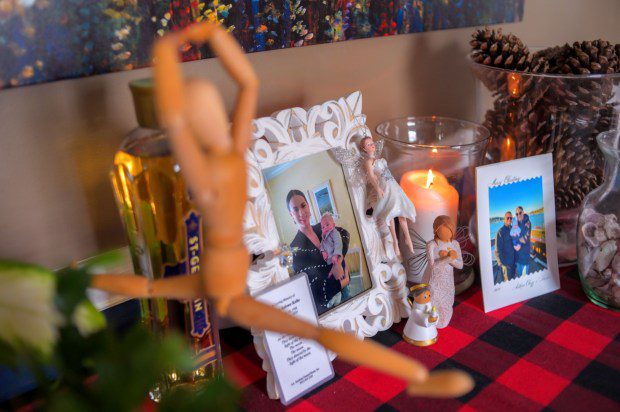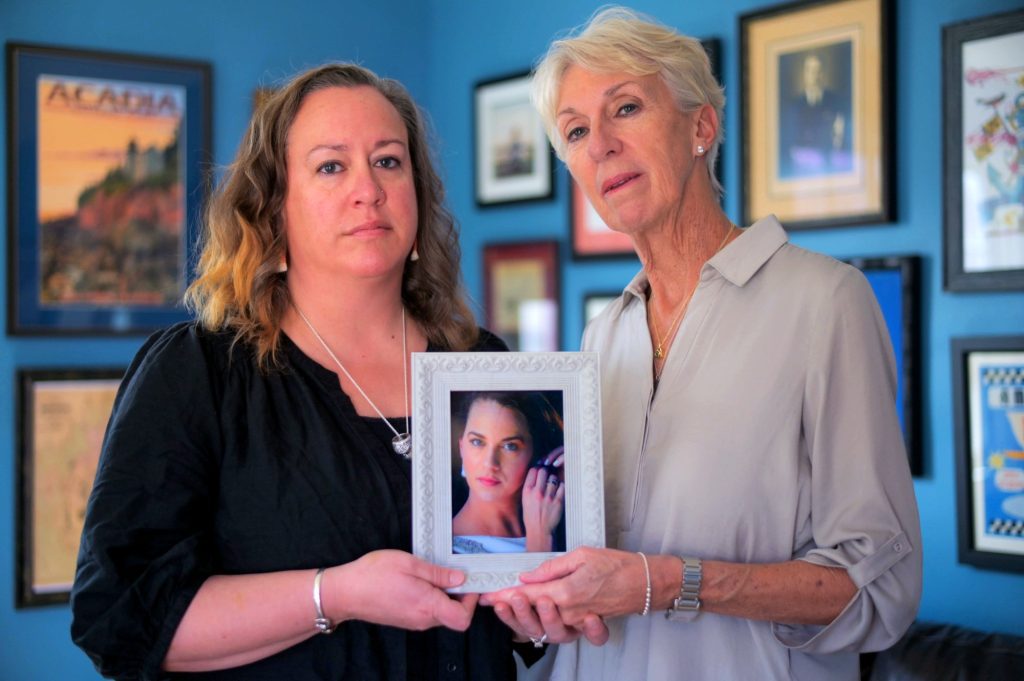There are signs of Andrea Kolbe all over her older sister, Kyra Vocci.
A long chain holding Kolbe’s wedding ring (a fancy silver band) is close to Vocci’s heart, next to a locket engraved with Kolbe’s photo and fingerprint. On Vocci’s forearm, there is a rainbow and a quote that Kolbe liked: “There is a rainbow of hope at the end of every storm.”
Vocci referred to each other as soul sisters, with tears in her eyes.
In December, the day after Kolbe's 35th birthday and four months after giving birth to her first child, she ended her own life at her Long Island, New York, home. When Vocci received the news, she fell to the floor and screamed so loudly and for so long that her neighbors called the police.
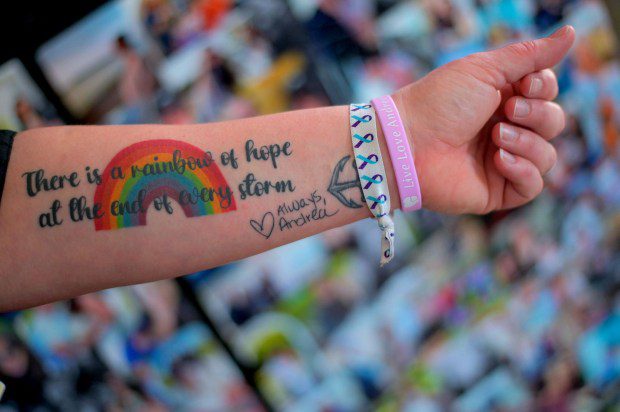
Before Kolbe passed away, she was dealing with postpartum depression, a mood disorder characterized by ongoing feelings of sadness, worthlessness, guilt, and shame. This condition can lead new mothers to have frightening and unwanted thoughts about accidentally or intentionally causing harm to themselves or their baby.
Postpartum depression is different from the “baby blues” – a mild and temporary form of depression experienced by most new mothers that usually goes away within two weeks after giving birth. This mood disorder is more severe, and although less common, studies suggest that up to 15% of people who have a baby will experience it. Black women and those with a history of depression or bipolar disorder are particularly at risk.
According to national and local experts, there is still a lack of screening and treatment for postpartum depression across the country. Until recently, there was no standardized approach for gathering data on maternal deaths from suicide. Now, studies indicate that nearly 1 in 5 maternal deaths in the country are a result of suicide, making such deaths more common than those caused by postpartum hemorrhage or hypertensive disorders.
Recently, Vocci, from Towson, and her mother, Lisa Kolbe from Gaithersburg, have been channeling their grief into advocacy. Earlier this month, they both provided testimony in favor of a bill in the General Assembly that would connect at-risk pregnant women and new mothers to their local health departments. Both the House and Senate have passed versions of the bill.
Lisa Kolbe is honest about how she is coping. She is shattered. However, Andrea — pronounced as ahn-DREY-ah — would want her to be happy, so she is trying to move forward. And she doesn’t want to keep how her youngest daughter died private.
“I’m open about it with everyone,” she said. “It can’t be hush-hush anymore. It can’t. We’ve got to protect women. We’ve got to get them proper care.”
Infrequent screenings
Under guidelines from the American College of Obstetricians and Gynecologists In the last year, guidelines were released advising doctors to check women for depression and anxiety many times during their pregnancy and after they have a baby. However, based on data from public and private insurance companies, this usually does not happen.
For Medicaid patients in 2022, the rates for screening were 16% during pregnancy and 17% postpartum, based on data compiled by the nonprofit National Committee for Quality Assurance. The rates were even lower for people covered by private insurance — 9% during pregnancy and 11% postpartum.
At Mercy Medical Center and Greater Baltimore Medical Center, the hospitals that deliver the most babies in Baltimore and Baltimore County, doctors mentioned that they regularly check pregnant women and new mothers for mental health issues.
However, across the country, the maternity care system is inadequate, according to Joy Burkhard, executive director for the Policy Center for Maternal Mental Health. More than a third of counties are maternity care deserts, which means they have no hospitals or birth centers offering obstetric care and no obstetric providers, according to a 2022 report from the March of Dimes. A report from the March of Dimes was released in 2022..
Doctors who deliver babies also do not learn enough about maternal mental health in medical school, which makes it difficult for them to identify and address the conditions and educate their patients about them, Burkhard said.
“It’s a bit like the Wild West in terms of what kind of care someone might or might not get,” she said.
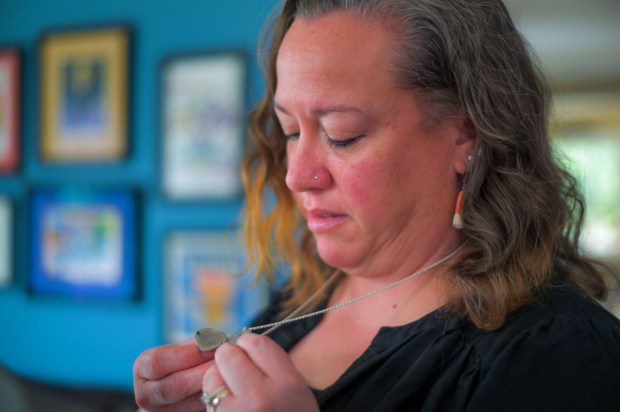
Last year, the policy center released report cards assessing each state’s effectiveness in screening for and treating maternal mental health conditions. Maryland received a C-minus — higher than the national D grade.
According to the report card, the state is excelling in some areas. Last year, the Maryland Department of Health announced that people eligible for Medicaid would be able to access benefits for their entire pregnancy and the 12-month postpartum period, regardless of their immigration status or any changes in income or household size. Maryland Department of Health stated that people eligible for Medicaid would be able to access benefits for their entire pregnancy and the 12-month postpartum period, regardless of their immigration status or any changes in income or household size.
However, the report card also noted that Maryland does not mandate providers to screen for maternal mental health disorders or require Medicaid to reimburse for that. A report released in 2016 by a task force created by the General Assembly said the state should start requiring screening. But that recommendation — like most others in the report — has yet to be fulfilled. report released in 2016 by a task force created by the General Assembly said the state should start requiring screening. But that recommendation — like most others in the report — has yet to be fulfilled.
Challenges to receiving treatment
Even when a woman is screened for depression, she may not be honest if she’s concerned her baby will be taken away, or her doctor will think she’s a bad mom. Despite being so common and treatable, maternal mental health problems remain misinterpreted by society.
“It’s a terrible stigma,” Vocci said. “Like, if you don’t feel blessed and joyful to have a baby, then something’s wrong with you.”
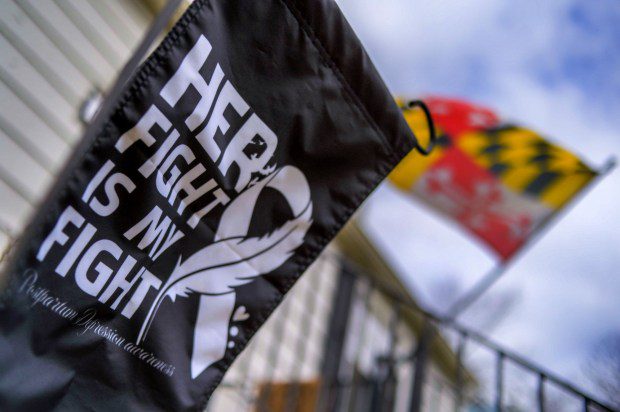
Then, there’s what occurs after screening: Research indicates that fewer than 25% of women who test positive for depression get mental health treatment. Black women are even less likely than white women to be screened and receive treatment, despite being more likely to experience perinatal mood disorders, explained Dr. Lindsay Standeven, clinical and education director of the Johns Hopkins Reproductive Mental Health Center.
There’s also a critical shortage of mental health workers, which has worsened since the start of the coronavirus pandemic. Some providers are hesitant to screen women for postpartum depression because they know how difficult it is to find help.
Mercy doesn’t have a quick solution for this issue, according to Dr. Robert Atlas, the chair of obstetrics and gynecology at the downtown Baltimore hospital.
Many of the mothers who give birth at Mercy come from urban neighborhoods where they did not have enough to eat or experienced trauma due to poverty, Atlas said. This persistent stress can lead to various pregnancy complications, including preeclampsia, delivering premature babies, and mood disorders such as depression and anxiety.
Finding a therapist or psychiatrist can also be particularly challenging for this group, as few mental health workers accept Medicaid — the plan that covers about 60% of Mercy’s patients, according to Atlas.
But assistance doesn’t have to only come from a therapist, said Standeven. She supports collaborative care models, in which different types of providers work together to treat patients. For example, an OB-GYN office may employ a social worker to help women navigate the mental health system.
“That kind of opens up the bottleneck that's currently blocking more severely mentally ill patients from being seen in-person by experts in the field,” she said. “Right now, we don’t have offense or defense. We just are flooded.”
Creating a disturbance
Vocci’s home is typically filled with the noise of three young boys, two cats and two dogs. But earlier this month, it was quiet as she stood in her kitchen in front of a shrine to her little sister.
Every day, Vocci lights a tall, milky white candle that sits before a framed photo of Kolbe. On the table, there is a vase filled with seashells resembling tiny ballet slippers. Kolbe, a dance instructor, previously referred to them as “slipper shells,” Vocci said. After her sister’s passing, she collected them at New York’s Crescent Beach — one of Kolbe’s favorite places.
More than three months after Kolbe took her own life, Vocci and her mother are starting to come to terms with the fact that grieving the loss of her will be a lifelong journey. Sometimes, when Vocci is driving, her stomach will sink as she re-realizes that her little sister is gone. Then, the tears come.
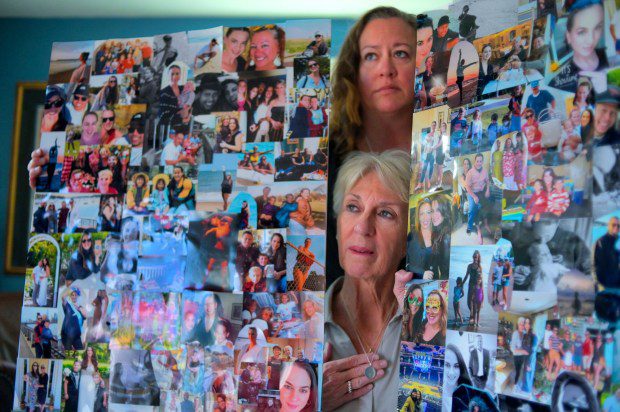
Vocci has always been attuned to local politics. Kolbe wasn’t as much — she’d tell her older sister to calm down when she was on a soapbox. With Kolbe no longer around to tease her, Vocci’s interest in policy has transformed into a potent source of purpose.
Vocci wants to establish a Maryland branch of Postpartum Support International, a nonprofit that works to raise awareness about the emotional changes women go through during pregnancy and after giving birth. She is also launching a charitable organization named after her sister — Andrea’s Wish Foundation.
The foundation is still new, but Vocci hopes that it will eventually raise enough funds to train healthcare providers to better address maternal mental health issues and help women afford therapy and find support groups.
According to Vocci, Kolbe left a significant impact on the Long Island dance community. She was involved in a dance center and taught and mentored numerous young girls over the years. Vocci is determined to ensure that her sister’s legacy extends far beyond New York.
“I am here to make some noise,” she said.
If you or a loved one are experiencing distressing or suicidal thoughts, assistance is available. Call or text 988, the country’s free suicide and crisis hotline. Expectant and new mothers can also dial or text 833-852-6262, the maternal health hotline run by the federal government.
